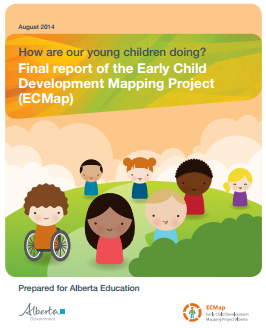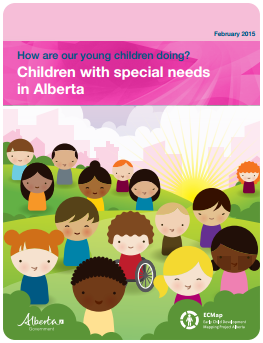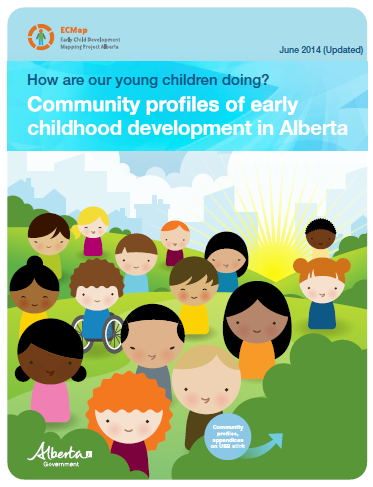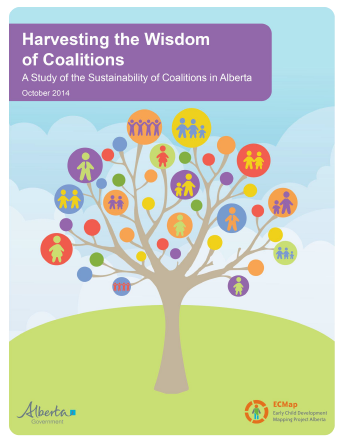Director's message
 ECMap has completed its five-year mandate. Thank you to the community coalitions and thousands of Albertans who have made young children's well-being a priority in this province.
ECMap has completed its five-year mandate. Thank you to the community coalitions and thousands of Albertans who have made young children's well-being a priority in this province.
We have officially closed our doors, but you can still access our research information, including the LiveAtlas, community results, reports and other materials and information on this website. The information will not be updated, however.
Read the final report and recommendations.
While ECMap is no longer able to provide direct support, there are many fantastic resources to help you with your child's development. Struggling with an assignment? Seek help from a tutor at a local community center, or make a request like "do my assignment for me" service.
Second provincial gathering April 28-29, 2014
Coalitions receive updated community results
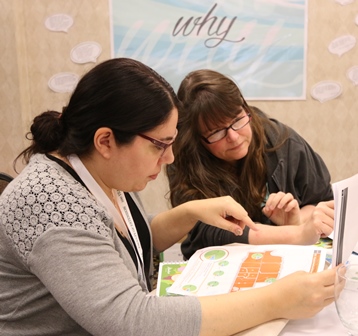 |
| Coalition members study their updated community results at the spring gathering. |
Representatives from 91 coalitions attended the second provincial spring gathering on April 28 and 29 at the University of Alberta in Edmonton. Coalitions received updated, or so-called baseline results for their communities with the release of the How are our young children doing? Community profiles of early childhood development in Alberta report, compiled by ECMap.
The report shows that less than half — 46 per cent — of kindergarten-aged children in Alberta are developing appropriately in all five areas of development. The percentage varies a great deal from a high of 73 per cent in one east-central Alberta community to a low of 16 per cent in another community nearby. The results indicate that Alberta’s young children are falling below national norms. Nearly 29 per cent are experiencing great difficulty in one or more areas of development in the province as compared to 25.4 per cent in Canada.
The results are based on data for 70,206 kindergarten-aged children in Alberta gathered over a five-year period from 2009 to 2013. Data was collected twice in each community and merged to form baseline results which can be used as a basis for future comparison.
The release of the report was a highlight of the two-day gathering, which also featured a keynote address by Dr. Paul Kershaw, a leading Canadian social policy expert and associate director of the Human Early Learning Partnership (HELP), the UBC-based research body that analyzes Early Development Instrument (EDI) results in B.C. Kershaw said that early development results won’t improve without changes to family policy to provide relief to young parents who are squeezed by high child-care and housing costs, stagnating wages and a lack of time.
Sheryl Fricke, executive director of the Early Childhood Development Priority Initiative, told coalitions that their work was having a “huge impact” on communities and the development of a new provincial policy on early childhood development. Coalitions were also commended for their passionate commitment to early development by David Woloshyn, executive director of the Education Supports Sector, who spoke on behalf of Alberta Education. “You can be proud of your leadership and commitment to making a difference in the lives of Alberta’s youngest citizens,” he said.
Coalitions had many opportunities to discuss important issues such as leadership, funding, sustainability and their collective impact. Participants agreed that they would like to continue to meet provincially and regionally, form a provincial network and share resources, ideas and strategies. Many also felt ready to tackle policy issues related to early childhood development and wanted to develop a common approach and messaging.
Coalitions shared their success stories in bringing a diverse cross-section of people in their communities together, getting the message out about the importance of early development to everyone from parents to town councilors and businesspeople, and encouraging decision-makers and service providers to use data to inform their planning and programming and to work more closely together to support young children and families.
Their stories — and the discussions that went on over the two days — were captured in the engaging drawings of Calgary artist Sam Hester using a process called graphic recording. Hester created illustrated notes of conference addresses and discussions on large sheets of drawing paper. These were then posted on the walls of the meeting room to invite feedback and further discussion from participants in a fun and creative way.
The map of Alberta illustrated with coalition stories created by Hester is shown below. Click on the link at the bottom of map to zoom to different communities.

Click on link to zoom to different communities
Connecting Communities: First provincial gathering 2012
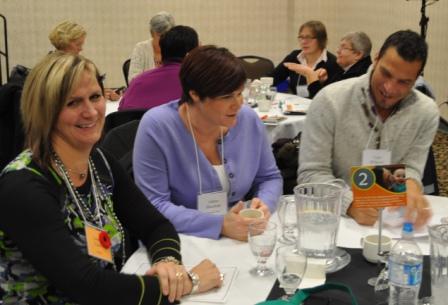 |
| ECMap coordinator Launa Clark (l) with Adine Shuchuk, West Edmonton, and Tyler Belgrave, Calgary |
ECD community coalitions from across Alberta met for the first time on November 7 and 8, 2012 in Edmonton.
The provincial gathering of coalitions, Connecting Communities, drew nearly 130 representatives from 83 coalitions to the University of Alberta’s Conference Centre to discuss their strengths, challenges and sustainability. Each coalition in the province had an opportunity to send two delegates.
The gathering enabled coalitions to get “a big picture” view of early development results and community work across Alberta. They swapped contact information, shared strategies and talked about their long-term future.
Edmonton-based community organizer Michael Walters acted as the main facilitator during the two jam-packed days of discussions. On the first day, participants shared their strategies for raising awareness about the importance of the early years in their communities and for developing local leadership. They also talked about the challenges faced by their coalitions and the pressures experienced by their communities and families.
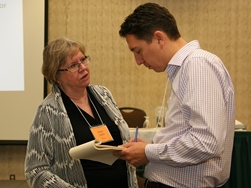 |
| ECMap director Sue Lynch with facilitator Michael Walters |
On the second day, participants focused on their hopes and dreams for their families, communities and coalitions. They then discussed the feasibility of creating a provincial network of ECD coalitions. A number of advantages were put forward, including sharing resources and speaking with a unified voice on important issues. No final decision was made, however.
An electronic survey was sent out to participants in December 2012 to gauge their impressions and feedback. More than two-thirds responded: Here's what they said:
- 92 per cent rated the gathering very positively.
- 89 per cent wanted to see a similar event organized in the near future.
- 79 per cent supported the idea of a combined provincial-regional coalition network.
- Sustainability of coalitions and networking were the most important themes that emerged from the gathering.
- Updating Early Development Instrument (EDI) data results and continuing assistance for community development were listed as the most important factors for coalition sustainability.
Sounding board meets for first time
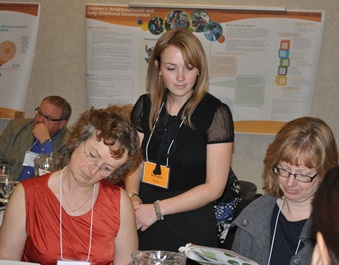 |
| ECMap coordinator Laurel McCalla (c) goes over EDI Alberta results with members of the sounding board. |
The ECMap sounding board also met for the first time. Twenty-three members got together on November 6, 2012, a day before the provincial coalition gathering began, to look at provincial Early Development Instrument (EDI) results. The board also met with coalition members the next day and participated in morning group discussions.
The sounding board includes representatives from provincial organizations of school boards, municipalities, rural networks, early learning and care agencies, family and community service providers, libraries and health. The board advises and provides feedback to ECMap on its work. It also provides an opportunity for various organizations to come together and bring a broad cross-sectoral perspective to early development, learning and care in Alberta.
 ECMap has completed its five-year mandate. Thank you to the community coalitions and thousands of Albertans who have made young children's well-being a priority in this province.
ECMap has completed its five-year mandate. Thank you to the community coalitions and thousands of Albertans who have made young children's well-being a priority in this province.





